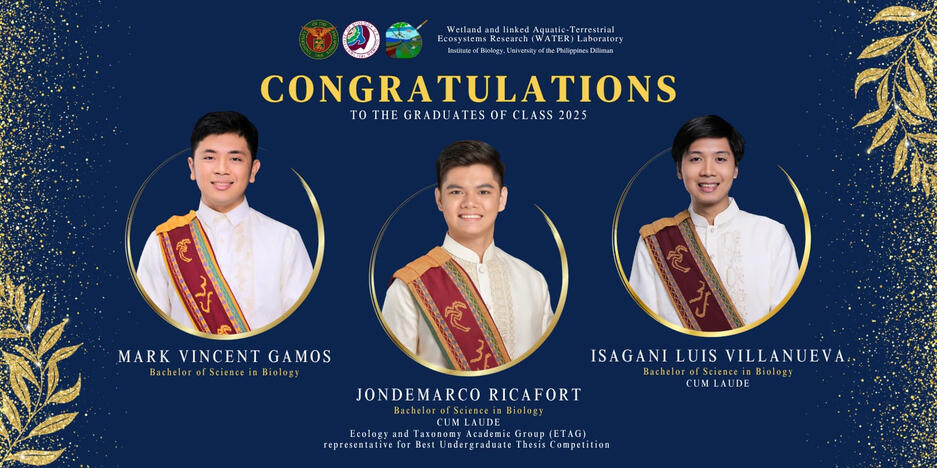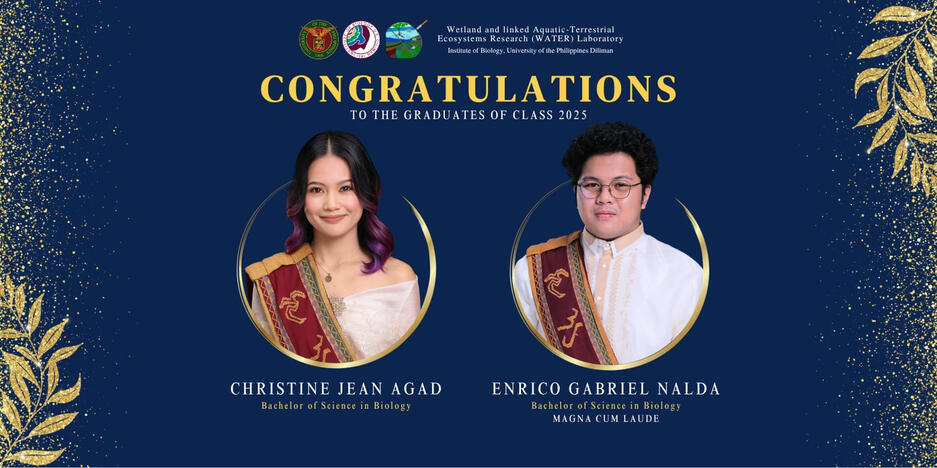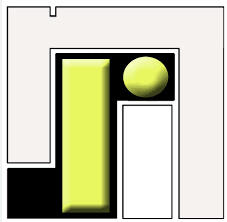Welcome to the WATER lab
Wetland and linked Aquatic-Terrestrial Ecosystems Research Laboratory
🌿 WATER Lab: Science Where Land and Water Connect.
The Wetland and Linked Aquatic-Terrestrial Ecosystems Research (WATER) Lab at the Institute of Biology, University of the Philippines Diliman, advances wetland science while exploring the vital connections between land and water to sustain biodiversity, water quality, and ecosystem resilience.
We conduct interdisciplinary research on coastal (mangroves, seagrasses) and inland (streams, rivers, lakes) wetlands, spanning conservation biology, restoration ecology, community ecology, and phylogenetic systematics. Our work integrates field surveys, laboratory analyses, data science, and ecological modeling to uncover the processes that sustain both ecosystems and human well-being.
The WATER Lab collaborates closely with local communities, government agencies, and regional research networks to co-create science-based solutions for conservation, restoration, and the sustainable management of wetland and freshwater ecosystems across the Philippines and Southeast Asia.
We are committed to nurturing the next generation of wetland and freshwater scientists while promoting the vital role of wetlands in climate adaptation, biodiversity conservation, and livelihood support.WATER Lab tagline: “Advancing wetland science and land-water linkages to sustain biodiversity, ecosystems, and communities.”#WATERLab #WetlandScience #AquaticEcology #Biodiversity #Conservation #ScienceForLife #UPDiliman #FreshwaterPH

CONGRATULATIONS! to the 2025 graduates of the Institute of Biology from WATER lab! We are proud so of you! Honor and Excellence!




Are you passionate about seagrass ecology, blue carbon, and integrated spatial ecology? Come join us!We’re inviting BS/MS Biology and BS Geodetic/MS Geomatics Engineering students (preferably in the thesis stage) to join the ASEAN Blue Carbon and Finance Profiling (ABCF) Project. This project, recently launched by UNDP, will delve into strengthening the sustainable management of blue carbon ecosystems across all ASEAN countries and Timor Leste 🌏.Interested, we’d love to hear from you!✅ Requirements:
✔️ Enrolled in any of the mentioned programs for AY 2025–2026 (Other graduate and undergraduate students within the College of Science are also encouraged to apply.)
✔️ Good moral character and physically fit
✔️ Willing to do seagrass fieldwork by October/November 2025 (field sampling costs funded by the project)✉️ Send a letter of intent and CV to:
📧 Dr. Severino Salmo III ([email protected])
📧 Dr. Ayin Tamondong ([email protected])This project is also receiving support from ASEAN and the Ministry of Japan.
Faculty
Research Staff





Blessa M. Elaurza
Hazel Anne C. Endico
Julie-An N. Gregorio
Precious B. Jacob
Ashemir B. Velasco

Jayson S. Del Rosario

John Kenneth R. Fraga

Sedney S. Mendoza

John Robert Z. Orias

Sean Paul B. Manalo
Basyuni, M., Amelia, R., Aznawi, A.A. et al. (2025). Reduction of mangrove carbon stock ecosystems due to illegal logging using a combination of unmanned aerial vehicle imagery and field surveys. Global Journal of Environmental Science and Management, 11(1). DOI: 10.22034/gjesm.2025.01.14
Basyuni, M., Mubaraq, A., Amelia, R., et al. (2025). Mangrove aboveground biomass estimation using UAV imagery and a constructed height model in Budeng–Perancak, Bali, Indonesia. Ecological Informatics, 86 (103037). https://doi.org/10.1016/j.ecoinf.2025.103037.
Dimaano, M.I.D., Mendoza, S.S., Uy-Yabut, C.J.C., Magbanua, F. S. (2025). Taxonomic and functional responses of stream macroinvertebrates across a gradient of agricultural land use in the Agusan River Basin, Southern Philippines. Aquatic Ecology. https://doi.org/10.1007/s10452-025-10207-9
Gerona-Daga, M.E.B, MacKenzie, R.A., Salmo, S. III. (2025). Photosynthetic characteristics of mangrove seedlings in chronosequence of restored and recolonized stands under field conditions. Bulletin of Marine Science, 101 (3). https://doi.org/10.5343/bms.2024.0020
Alpecho, B.C., Duya, M.R.M., Mendoza, N.Y.B., Magbanua, F. S. (2024). Littoral phytoplankton and zooplankton communities in a tropical reservoir: Pantabangan Reservoir, the Philippines. Journal of Plankton Research, 46(3). https://doi.org/10.1093/plankt/fbae006
Baludo, M.Y., Gregorio, J.-A. N., Papa, R.D.S., Magbanua, F.S. (2024) Diel vertical migration of zooplankton in a tropical stratified lake. Pacific Science, 77(4). doi:10.2984/77.4.4
Bourgeois, C. F., MacKenzie, R. A., Sharma, S., Bhomia, R. K., Johnson, N. G., Rovai, A. S., Worthington, T. A., Krauss, K. W., Analuddin, K., Bukoski, J. J., Castillo, J. A., Elwin, A., Glass, L., Jennerjahn, T. C., Mangora, M. M., Marchand, C., Osland, M. J., Ratefinjanahary, I. A., Salmo, S. G., III, Trettin, C. C. (2024). Four decades of data indicate that planted mangroves stored up to 75% of the carbon stocks found in intact mature stands. Science Advances, 10(27). https://doi.org/10.1126/sciadv.adk5430
Igloria, J.S., Seriño, E.K.L., Magbanua, F.S., Mazo, A.M., Pogado, F.O. (2024). Macroinvertebrate community as bioindicator of water quality in Tambis River, Palompon, Leyte. Journal of Environmental Science and Management, 27(1). ISSN 0119-1144
Larekeng, S.H., Nursaputra, M., Mappiasse, M.F., Ishak, S., Basyuni, M., Sumarga, E., Arifanti, V.B., Aznawi, A.A., Rahmila, Y.I., Yulianti, M., Rahmania, R., Mubaraq, A., Salmo III, S.G., Ali, H., Yenny, I. (2024). Estimation of mangrove carbon stocks using unmanned aerial vehicle over coastal vegetation. Global Journal of Environmental Science and Management, 10(3). DOI: 10.22034/gjesm.2024.03.13
Naputo C.F., Isowa, Y., Gerona-Daga, M.E.B., Artigas, M.D., Kajita, T., Salmo III, S.G. (2024). Application of eDNA metabarcoding in the assessment of fish biodiversity in Philippine mangroves: Challenges and opportunities. Regional Studies in Marine Science, 77(10). https://doi.org/10.1016/j.rsma.2024.103642
Nguyen, H.V, Duong, V.C., Sareein, N., Uy-Yabut, C.J.C., Tran, A.D., Nguyen, V.V. (2024). Biodiversity of Aquatic Insects and Water Quality Parameters in Thac Bac Stream, Tam Dao National Park, Vietnam. Chiang Mai Journal of Science, 51(6). https://doi.org/10.12982/CMJS.2024.092
Pandiangan, P., Basyuni, M., Amelia, R., Al Mustaniroh, S. S., Elfiati, D., Sidik, F., Arifanti, V. B., Sivaipram, I., & Salmo III, S. G. (2024). Structure and composition of rehabilitated mangrove in Lubuk Kertang Village, North Sumatra, Indonesia. IOP Conference Series. Earth and Environmental Science, 1352, (012065). DOI 10.1088/1755-1315/1352/1/012065
Salmo, S. III., Analuddin, K., MacKenzie, R., Sharma, S., eds. (2024). The mangroves of Southeast Asia in the United Nation’s decade on ecosystem restoration. Lausanne: Frontiers Media SA. doi: 10.3389/978-2-8325-4384-9
Velasco, A., Magbanua, F.S., del Rosario, J.S. et al. Groundwater Quality Variations during Wet and Dry Seasons in Agricultural and Forested Areas in the Philippines. Water Resour 51 (Suppl 2), S293–S305 (2024). https://doi.org/10.1134/S0097807824604849

Institute of Biology
University of the Philippines Diliman
Ma. Regidor Street Diliman, Quezon City, Philippines, 1101UP Trunk Line: (632)981-8500
loc. 3728Email:
Severino III G. Salmo, PhD
[email protected]Francis S. Magbanua, PhD
[email protected]Christine Jewel C. Uy-Yabut, PhD
[email protected]




Asst. Professor Christine Jewel C. Uy-Yabut, Ph.D.
Phylogenetic Systematics of Insects group (PhySIg)

Dr. Christine Jewel C. Uy-Yabut is interested in research such as Insect Systematics and Phylogeny specifically the aquatic insect Order Trichoptera. During her Ph.D. in Korea University, she investigated the phylogenetic relationships of one large subfamily of Trichoptera (subfamily Macronematinae). She was able to describe new species from this group as well.There are very few described insect species in the Philippines especially the aquatic insects considered that our country is a "biodiversity hotspot". Therefore, Christine's main goal is to find the new species and have a good distributional records and barcode library of Philippine insects. She wants to explain the patchy distribution of insect species especially that Philippines has high endemicity.
Education
Integrated MS/Ph.D. in Life Sciences (Molecular Biology), Korea University, 2019B.S. Biology, University of the Philippines Baguio, 2008
Links
DNA Barcoding of insect species in the University of the Philippines Diliman Campus
Funding agency: Natural Sciences Research Institute (NSRI) UP Diliman
January to December 2025

Insect Diversity Assessment in the University of the Philippines Diliman Campus
Funding agency: Natural Sciences Research Institute (NSRI) UP Diliman
January to December 2024

Current
Hazel Anne C. Endico
Current
Mark Vincent Gamos
Mily Shey Gata
Lysandra Narquita
Jondemarco Ricafort
Jericho Van Charles Valenzuela
Isagani Villanueva






Professor Francis S. Magbanua, Ph.D.
Freshwater Science & Management (FSM) group

Dr. Francis S. Magbanua is one of the leading freshwater scientists in the country. His Ph.D. research at University of Otago in New Zealand was on the impacts of agricultural intensification on stream health which significantly contributed to our understanding of the effects of human activities on freshwater ecosystems.Francis has also collaborated with national government agencies (Department of Environment and Natural Resources—Environmental Management Bureau, DENR—Biodiversity Management Bureau) to serve as a resource person on inland wetland biodiversity monitoring, influencing policy and practice in the field, and with private corporations (Energy Development Corporation, First Gen Hydro Power Corporation, HOLCIM Philippines, Inc.) to implement freshwater biodiversity conservation and monitoring programs, demonstrating the practical application of his research.Francis's current field of research is focused on the biomonitoring of streams, lakes, and groundwater ecosystems. He and his graduate students are developing multimetric biotic indices for water quality monitoring. In addition to his research and mentoring, he is president of the Philippine Society for Freshwater Science, treasurer of the Path Foundation Philippines Board of Trustees, executive board member of the Asian Society for Hydrobiology (ASH), and member of the National Research Council of the Philippines (NRCP) and Southeast Asian Limnological Network (SEALNet).
Education
Ph.D. (Zoology), University of Otago, Dunedin, New Zealand, 2012Certificate in Sustainable Environmental Management (Bearhs Environmental Leadership Program), University of California, Berkeley, USA, 2005M.S. (Environmental Science), University of the Philippines Diliman, 2004B.S. (Zoology), Pamantasan ng Lungsod ng Maynila (University of the City of Manila), 1994
Links
Current
Current
Current









Assoc. Professor Severino III G. Salmo, Ph.D.

Dr. Severino III G. Salmo is among the country’s leading experts in blue carbon and mangrove ecology.During his Ph.D. at the University of Queensland, he investigated the effects of typhoons on restored mangroves and found that forest recovery trajectory was stalled by at least five to ten years.Dr. Salmo’s recent research focuses on the biodiversity, carbon sequestration, structure, and dynamics of natural, restored, and recolonized mangrove forests. His expertise in mangroves led to frequent collaborations with local governments, national agencies, and non-government organizations where he advises science-based policies and strategies on mangrove conservation, restoration, and management.
Education
Ph.D. Biological Science, The University of Queensland, 2011M.S.B.S.
Links
Rehabilitation of Degraded Mangroves
Funding agency: United States Forest Service (USFS)
August 2023 to November 2024

Assessment and Comparison of Recovery of Biodiversity and Carbon Sequestration in Philippine Mangroves Among Natural, Replanted, and Naturally-recolonized Mangrove Stands
Funding agency: U.S. Agency for International Development Partnerships for Enhanced Engagement in Research (USAID PEER) Science, USA
January 2022 to April 2024

Integrated Network-based Management for SEA Coasts (InMSEA)
Funding agency: Department of Science and Technology Philippine Council for Industry, Energy, and Emerging Technology Research and Development (DOST-PCIEERD)
February 2022 to April 2023

Current
Sean Paul B. Manalo
Current
Current









